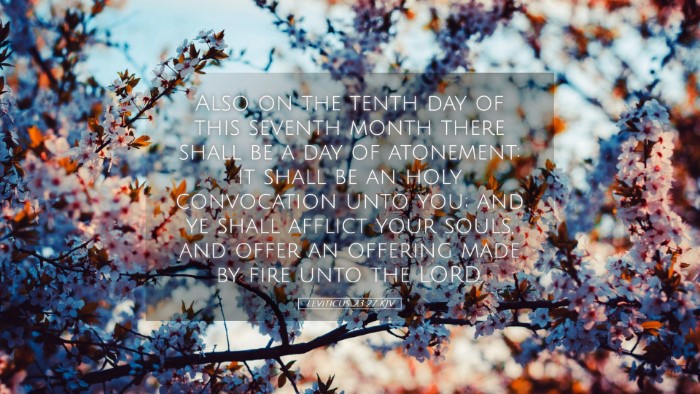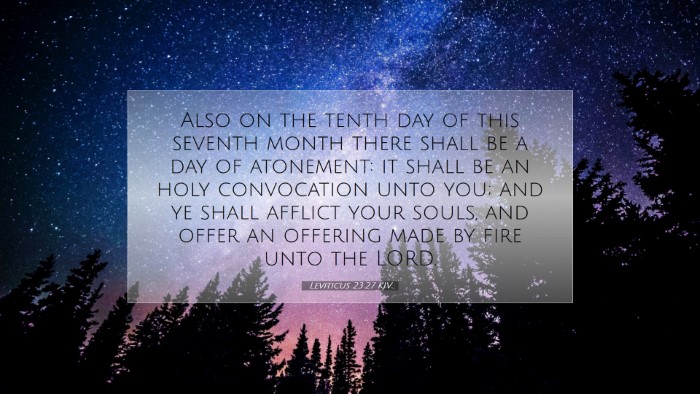Commentary on Leviticus 23:27
Bible Verse: "Also on the tenth day of this seventh month there shall be a day of atonement: it shall be a holy convocation unto you; and ye shall afflict your souls, and offer an offering made by fire unto the LORD."
Introduction
Leviticus 23:27 marks a pivotal moment in the Levitical law, introducing the Day of Atonement (Yom Kippur), a significant event in the Jewish calendar that symbolizes repentance, reflection, and divine forgiveness. This commentary synthesizes insights from notable public domain theologians such as Matthew Henry, Albert Barnes, and Adam Clarke to provide a comprehensive understanding of this important verse.
Contextual Background
The book of Leviticus serves as a manual for holiness, outlining rites, regulations, and responsibilities for the Israelites as they approached a holy God. Within this framework, the Day of Atonement stands out as a day dedicated to atonement and reconciliation.
-
Historical Significance:
Leviticus was written to guide the Israelites in their worship and social conduct. The Day of Atonement was instituted to provide a means for dealing with sin and maintaining the covenant relationship with God.
-
Covenantal Aspect:
The observance of this day illustrates God’s commitment to reconciliation and the necessity for Israel to approach Him in humility and repentance.
The Day of Atonement
The specifics of the Day of Atonement reveal deeper theological implications for both ancient Israel and contemporary understanding of sin and redemption.
-
Affliction of Souls:
Matthew Henry emphasizes that the phrase "afflict your souls" indicates a call to humility and self-examination. It invites the community to engage in solemn introspection regarding their actions and attitudes towards God.
-
Holy Convocation:
Albert Barnes describes the "holy convocation" as a sacred gathering, which not only signifies a national observance but also a time for individual and corporate recognition of sinfulness and need for divine intervention.
-
Offerings Made by Fire:
Adam Clarke suggests that the offerings of fire indicate the purifying nature of sacrifice, pointing to the seriousness of sin and the necessity of blood for atonement. This foreshadows the ultimate sacrifice of Christ as the Lamb of God.
Theological Implications
The Day of Atonement is not merely a historical observance; it carries profound theological significance that resonates through both Old and New Testament contexts.
-
Holiness of God:
This day serves as a stark reminder of God's holiness and righteousness. Sin violates God's nature and requires atonement, affirming that without the shedding of blood, there is no forgiveness (Hebrews 9:22).
-
Repentance:
The call to "afflict your souls" underscores the necessity of genuine repentance. Both Henry and Clarke highlight that sincere remorse and acknowledgment of sin are critical for receiving God’s mercy.
-
Foreshadowing Christ:
Barnes notes the typological significance of the sacrifices on this day, providing a picture of Christ, whose atoning work fulfills the requirements laid out in the Levitical system. The rituals surrounding Yom Kippur point forward to the ultimate atonement achieved through Christ’s sacrifice.
Practical Reflections
For modern readers, Leviticus 23:27 imparts several reflections that are crucial for personal and communal spirituality.
-
Call to Holiness:
The observance of the Day of Atonement is a call to contemporary believers to engage in practices that promote holiness and draw closer to God. This includes regular confession and repentance.
-
Community Worship:
In stressing the communal aspect of this observance, churches today are reminded of the importance of collective worship, accountability, and the shared experience of grace.
-
Holy Remembrance:
Regularly reflecting on our need for atonement and the grace provided through Christ ensures that believers maintain a posture of humility and gratitude towards God.
Conclusion
Leviticus 23:27 encapsulates the essence of atonement and the seriousness of sin. Insights drawn from Matthew Henry, Albert Barnes, and Adam Clarke reveal not only the historical and cultural significance of this day but also its theological implications that extend to the Christian faith today. For pastors, students, theologians, and scholars, this passage serves as a foundation upon which to explore the depth of God’s mercy and the beauty of repentance in the journey of faith.


